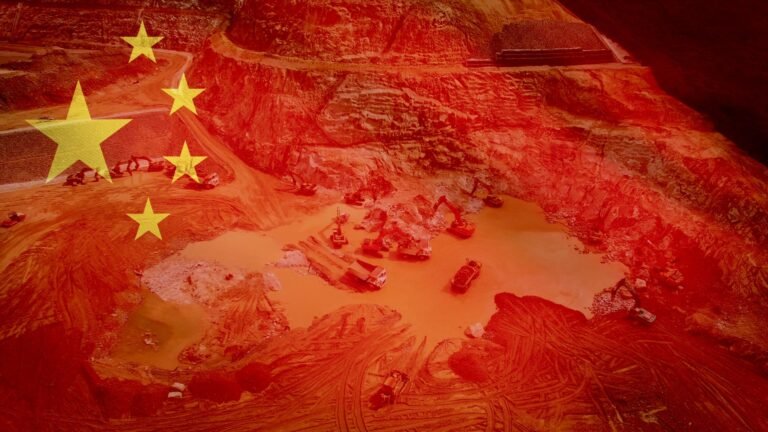Illustration of the national flag of the People’s Republic of China and a mining site.
Craig Hastings | Moment | Getty Images
Beijing has been stepping up controls on rare earth exports, triggering global shortages and exposing industries’ dependence on Chinese supply chains.
However, over recent years, China itself has become reliant on rare earth supplies from an unexpected source: the relatively small and war-torn economy of Myanmar.
While China is the world’s top producer of rare earths, it still imports raw materials containing the coveted metals from abroad.
Myanmar accounted for about 57% of China’s total rare earth imports last year, Gracelin Baskaran, director of the Critical Minerals Security Program at the Center for Strategic and International Studies, told CNBC.
According to Chinese Customs data, Myanmar’s rare earth exports to China significantly picked up in 2018 and reached a peak of nearly 42,000 metric tons by 2023.
Baskaran added that the imports from Myanmar are also particularly high in heavy rare earth element contents, which are generally less abundant in the earth’s crust, elevating their value and scarcity.
“Myanmar’s production has significantly strengthened China’s dominant position, effectively giving Beijing a de facto monopoly over the global heavy rare earths supply chain — and much of the leverage it wields today.”
The country has become a key source of two highly sought-after heavy rare earths, dysprosium and terbium, that play crucial roles in high-tech manufacturing, including in defense and military, aerospace and renewables sector.
“This dynamic has given rise to a supply chain in which extraction is concentrated in Myanmar, while downstream processing and value addition are predominantly carried out in China,” said Baskaran.
Why Myanmar?
Myanmar is home to deposits that tend to have higher heavy rare earth content, David Merriman, research director at Project Blue, told CNBC.
These “ionic adsorption clay” or IAC deposits are exploited through leaching methods that apply chemical reagents to the clay — and that comes with high environmental costs.
According to Merriman, the vast majority of the world’s IAC operations were in Southern China in the early to mid-2010s. But, as Beijing began implementing new environmental controls and standards in the rare earths industry, a lot of these projects began to close down.
“Myanmar, particularly the North of the country, was seen as a key region which had similar geology to many of the IAC deposit areas within China,” Merriman said.
“You started to see quite a rapid build out of new IAC type mines within Myanmar, essentially replacing the domestic Chinese production. There was a lot of Chinese business involvement in the development of these new IAC projects.”
The rare earths extracted by these IAC miners in Myanmar are then shipped to China mostly in the form of “rare earth oxides” for further processing and refining, Yue Wang, a senior consultant of rare earths at Wood Mackenzie, told CNBC.
In 2024, a report from Global Witness, a nonprofit focused on environmental and human rights abuses, said that China had effectively outsourced much of its rare earth extraction to Myanmar “at a terrible cost to the environment and local communities.”
China’s rare earth risks
China’s reliance on Myanmar for rare earths has also opened it up to supply chain risks, experts said.
According to Global Witness’s research, most of the heavy rare earths from Myanmar originate from the Northern Kachin State, which borders China. However, following Myanmar’s violent military coup in 2021, the military junta has struggled to maintain control of the territory amid opposition from the public and armed groups.
“Myanmar is a risky jurisdiction to rely on, given the ongoing Civil War. In 2024, the Kachin Independence Army (KIA), a group of armed rebels, seized sites responsible for half the world’s heavy rare earths production,” said CSIS’ Baskaran.
Since the seizure, there have been reports of supply disruptions causing spikes in the prices of some heavy rare earths. According a Reuters report, the KIA was seeking to use the resources as leverage against Beijing.
Chinese customs data shows, imports of rare earth oxides from Myanmar fell by over a third in the first five months of the year compared to the same period last year.
“If Myanmar were to cease all exports of rare earth feed stocks to China, China would struggle to meet its demand for heavy rare earths in the short term,” said Project Blue’s Merriman.
Not surprisingly, Beijing has been looking to diversify its sources of heavy rare earths.
According to Merriman, there are IAC deposits in nearby countries, including Malaysia and Laos, where some projects have been set up with Chinese involvement.
Still, he notes that environmental standards are expected to be higher in those countries, which will present challenges for rare earth miners.
China’s decision to cut back on its own extraction of heavy rare earth elements may serve as a warning to other countries about the costs of developing such projects. A report by Chinese media group Caixin in 2022 documented how former IAC operation sites in Southern China had left behind toxic water and contaminated soil, hurting local farmers’ livelihoods.

